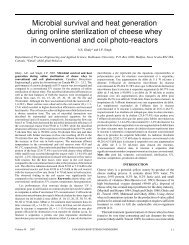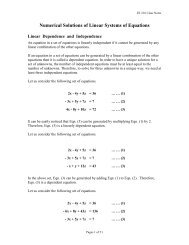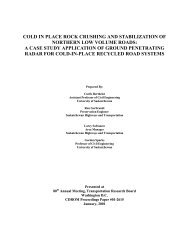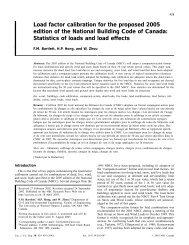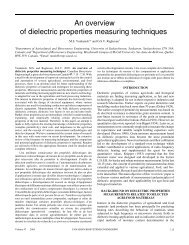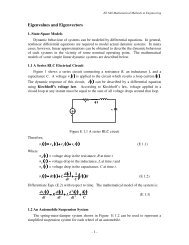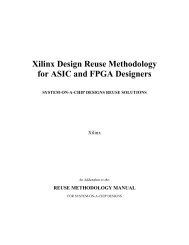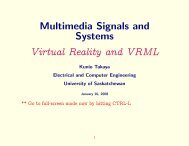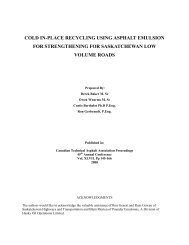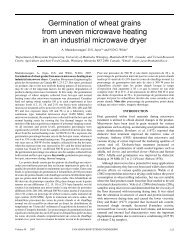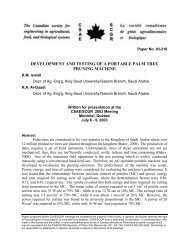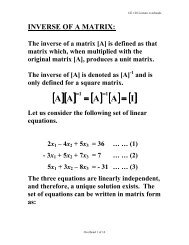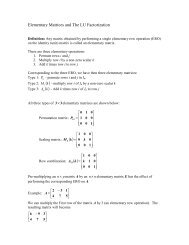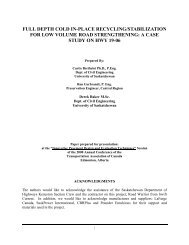BERTHELOT, CROCKFORD & LYTTON 5different; mixes 900903 and 900960 were not significantly different; and mixes 900901, 900903, and900961 were not significantly different.A one-way analysis <strong>of</strong> variance concluded that Radisson SPS-9A <strong>asphalt</strong> <strong>concrete</strong> mix type had asignificant effect on the mean Marshall flow measurements. Duncan's pairwise <strong>comparison</strong> determinedthat the mean Marshall flow <strong>of</strong> mixes 900959 and 900962 were not significantly different; mixes 900902,900903, 900959, and 900960 were not significantly different; and mixes 900901, 900902, 900903,900960, and 900961 were not significantly different.The Marshall stabilometer is widely used throughout the road industry due to its simplicity, costeffectiveness, repeatability, and concomitant empirical experience. The Marshall stabilometer was foundto distinguish some significant differences between the Radisson SPS-9A <strong>asphalt</strong> <strong>concrete</strong> mixes.Limitations <strong>of</strong> the Marshall stabilometer include: it is unable to provide feedback controlled on-samplemulti-axial mechanistic measurements; it specifies a small sample size (62.5 mm by 101 mm); it appliesboundary tractions under curvilinear platens resulting in nonlinear stress-strain fields; it does not have theability to apply confinement tractions to the sample; and it is designed for testing <strong>asphalt</strong> <strong>concrete</strong> at 60°Cat a specified displacement rate <strong>of</strong> 1.3 mm/min. As a result, the Marshall stabilometer cannot be used tocharacterize the fundamental thermomechanical constitutive behavior <strong>of</strong> <strong>asphalt</strong> <strong>concrete</strong> across stressand strain states, stress and strain rates, and temperatures representative <strong>of</strong> those experienced in the fieldas required for mechanistic road-modeling. The Marshall stabilometer was found not to provide properranking <strong>of</strong> the Radisson SPS-9A <strong>asphalt</strong> <strong>concrete</strong> mixes concomitant to field <strong>rut</strong>ting performance afterthree years <strong>of</strong> service.4.2 Hveem Stability CharacterizationHveem stability <strong>characterization</strong> <strong>of</strong> <strong>asphalt</strong> <strong>concrete</strong> has been widely used by the road industry and isspecified in ASTM D1561 and AASHTO T246. Hveem stability testing was performed on triplicategyratory compacted samples at seven percent air voids from each Radisson SPS-9A <strong>asphalt</strong> <strong>concrete</strong> mix.Table 4 summarizes the Hveem stability measurements across the Radisson SPS-9A <strong>asphalt</strong> <strong>concrete</strong>mixes.A statistical analysis was performed at a 95 percent confidence level to evaluate the significance <strong>of</strong> theHveem stability measurements across the Radisson SPS-9A <strong>asphalt</strong> <strong>concrete</strong> mixes. A one-way analysis<strong>of</strong> variance concluded that Radisson SPS-9A <strong>asphalt</strong> <strong>concrete</strong> mix type had a significant effect on themean Hveem stability measurements. Duncan's pairwise <strong>comparison</strong> determined that the mean Hveemstability <strong>of</strong> mix 900902 was significantly different from all other mixes; however, mixes 900960 and900962 were not significantly different; mixes 900903, 900959, and 900961 were not significantlydifferent; and mixes 900901 and 900961 were not significantly different.The Hveem stabilometer was found to distinguish some significant differences between the RadissonSPS-9A <strong>asphalt</strong> <strong>concrete</strong> mixes and produced a low mean coefficient <strong>of</strong> variation. A drawback to theHveem stabilometer is it requires a high capacity load frame, which increases the owning and operatingcosts and renders it impractical for field testing. In addition, like the Marshall stabilometer, the Hveemstabilometer does not provide feedback controlled on sample multi-axial mechanistic measurements and itspecifies a small sample size (62.5 mm diameter by 101 mm tall). As a result, the Hveem stabilometercannot be used to characterize the fundamental thermomechanical constitutive behavior <strong>of</strong> <strong>asphalt</strong><strong>concrete</strong> across stress and strain states, stress and strain rates, and temperatures representative <strong>of</strong> thoseexperienced in the field as required for mechanistic road-modeling. The Hveem stabilometer was found
BERTHELOT, CROCKFORD & LYTTON 6not to provide proper ranking <strong>of</strong> the Radisson SPS-9A <strong>asphalt</strong> <strong>concrete</strong> mixes concomitant to field <strong>rut</strong>tingperformance after three years <strong>of</strong> service.Table 4 Hveem Stability Measurements and Duncan's Pairwise Comparison <strong>of</strong> Radisson SpecificPavement Studies-9A Asphalt Concrete MixesSPS-9A Test Mean Hveem HveemDuncan's Grouping*Section Stability StabilityCoefficient <strong>of</strong>Variation(Percent)900901 28.61 1.94 D900902 40.02 1.44 A900903 32.53 3.32 C900959 30.95 7.38 C900960 34.78 3.71 B900961 30.80 2.70 C D900962 35.32 3.68 BMean 33.29 3.45* Asphalt <strong>concrete</strong> mixes with same letter are not significantly different.4.3 Unconfined Compressive Strength CharacterizationUnconfined compressive strength testing <strong>of</strong> <strong>asphalt</strong> <strong>concrete</strong> is standardized in ASTM D1074 andAASHTO T167. Unconfined compressive strength testing was performed on triplicate gyratorycompacted samples at seven percent air voids from each Radisson SPS-9A <strong>asphalt</strong> <strong>concrete</strong> mix at 5°C,20°C, 40°C, 70°C, and 100°C. Tables 5 and 6 summarize the mean unconfined compressive strengthmeasurements across the Radisson SPS-9A <strong>asphalt</strong> <strong>concrete</strong> mixes and test temperatures respectively.A statistical analysis was performed at a 95 percent confidence level to evaluate the significance <strong>of</strong> theunconfined compressive strength measurements across the Radisson SPS-9A <strong>asphalt</strong> <strong>concrete</strong> mixes andtest temperatures employed in the analysis. A two-way analysis <strong>of</strong> variance concluded that RadissonSPS-9A <strong>asphalt</strong> <strong>concrete</strong> mix type, test temperature and the interaction effects <strong>of</strong> mix type and testtemperature had a significant effect on the mean unconfined compressive strength measurements..Duncan's pairwise <strong>comparison</strong> determined that the mean unconfined compressive strength <strong>of</strong> mixes900959 and 900962 were significantly different from all other mixes; however, mixes 900901, 900902,900903, and 900960 were not significantly different; and mixes 900901, 900902, 900903 and 900961were not significantly different. Duncan's pairwise <strong>comparison</strong> across the test temperatures grouped byRadisson SPS-9A <strong>asphalt</strong> <strong>concrete</strong> mix determined that the mean unconfined compressive strengths at5°C, 20°C, and 40°C were significantly different from those at all other temperatures; however, there wasno significant difference between 70°C and 100°C.
- Page 1: COMPARISON OF ALTERNATIVE TEST METH
- Page 5: BERTHELOT, CROCKFORD & LYTTON 44.0
- Page 9 and 10: BERTHELOT, CROCKFORD & LYTTON 8unco
- Page 11 and 12: BERTHELOT, CROCKFORD & LYTTON 10no
- Page 13 and 14: BERTHELOT, CROCKFORD & LYTTON 124.4
- Page 15 and 16: BERTHELOT, CROCKFORD & LYTTON 14Tab
- Page 17 and 18: BERTHELOT, CROCKFORD & LYTTON 16Tab
- Page 19 and 20: BERTHELOT, CROCKFORD & LYTTON 18Fig
- Page 21 and 22: BERTHELOT, CROCKFORD & LYTTON 20For
- Page 23 and 24: BERTHELOT, CROCKFORD & LYTTON 22Tab
- Page 25 and 26: BERTHELOT, CROCKFORD & LYTTON 24Tab
- Page 27 and 28: BERTHELOT, CROCKFORD & LYTTON 2650C
- Page 29 and 30: BERTHELOT, CROCKFORD & LYTTON 28Tab
- Page 31 and 32: BERTHELOT, CROCKFORD & LYTTON 307.



